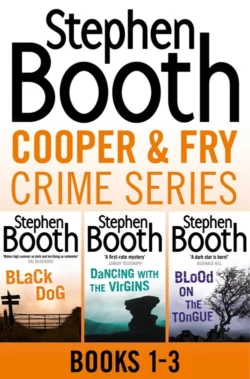Cooper and Fry Crime Fiction Series Books 1-3: Black Dog, Dancing With the Virgins, Blood on the Tongue

Stephen Booth
Тип: электронная книга
Жанр: Современная зарубежная литература
Язык: на английском языке
Стоимость: 1244.20 ₽
Статус: В продаже
Издательство: HarperCollins
Дата публикации: 16.04.2024
Отзывы: Пока нет Добавить отзыв
О книге: Three novels featuring Derbyshire police detectives, DC Ben Cooper and DS Diane Fry from award-winning crime writer Stephen Booth.BLACK DOG – The long, hot Peak District summer came to an end when they found Laura Vernon′s body. But for local policeman Ben Cooper the work has just begun. His community is hiding a young girl′s killer and a past as dark as the Derbyshire night. It seems Laura was the keeper of secrets beyond her years and, in a case where no-one is innocent, everyone is a suspect…DANCING WITH VIRGINS – The ring of cairns known as the Nine Virgins has stood on the windswept moors of Derbyshire for centuries. Now, as winter closes in, a tenth figure is added – a body – and a modern tragedy is added to the dark legend that surrounds the stones. There′s no shortage of suspects, but what DS Fry and DC Cooper lack is any kind of motive. As they search separately for answers, it seems the reasons for the strange behaviour of the moor′s inhabitants may lie somewhere in the past, in a terrible crime yet to be discovered…BLOOD ON THE TONGUE – Marie′s was not the only body lying undiscovered under the Peak District snow that January morning – nor the first. In 1945, the wreckage of a bomber was found, full of dead crewmen. The missing pilot was declared responsible and the only other survivor refuses to talk. When the pilot’s granddaughter arrives to uncover the truth, DC Ben Cooper is intrigued. To his boss, DS Fry, her colleague′s interest is entirely unprofessional. But the past has a way of influencing the present and before either knows it, a long-cold trail in the dead of winter has grown dangerously hot …